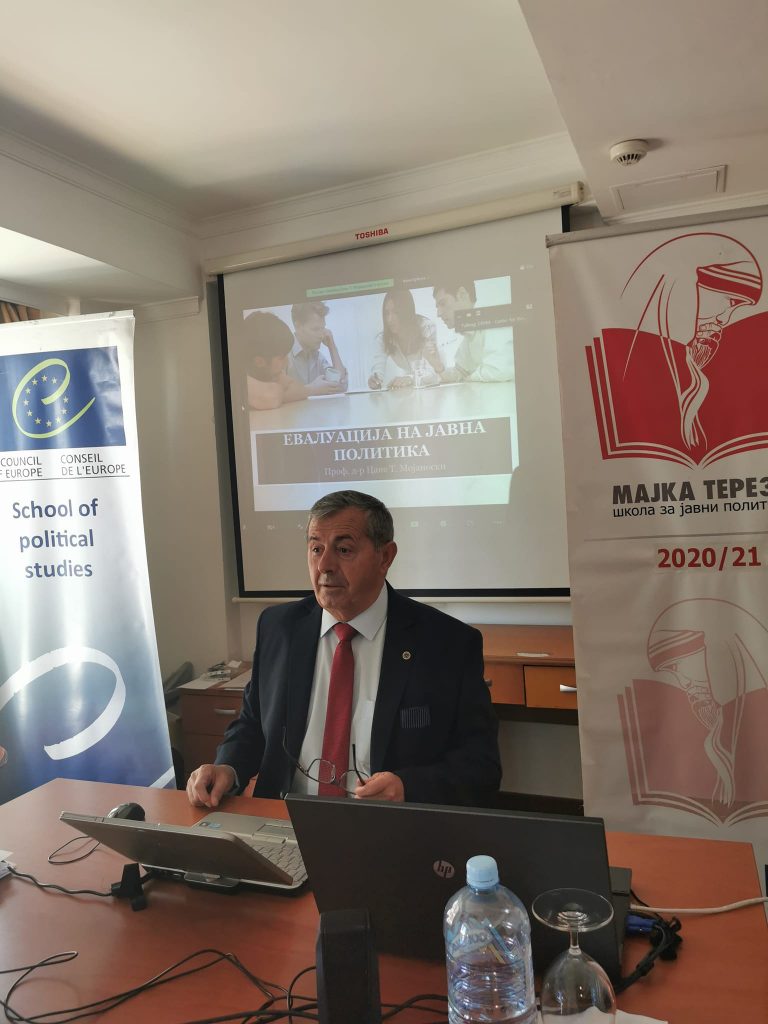Fall Session of School of Public Policy Mother Teresa to be held on November 19-21, 2021, at Hotel Garden, Ohrid, and online
The topic of the session was Public Policy Analysis. This is an introductory seminar to induce participants to the general topic of the School of Public Policy. The general aim of the school is to improve the knowledge of the participants in the field of public policy and give them practical insights into political processes. They are future leaders of our country. As such they need to have skills and knowledge to improve the policy making process. It is widely accepted that policy analysis is a technique used in public administration to enable civil servants to examine and evaluate the available options to implement the goals of elected officials. Policy analysis has been defined as the process of “determining which of various policies will achieve a given set of goals in light of the relations between the policies and the goals. Independent policy analysis can be made by think tanks, universities, professional associations, trade unions and other members of the so-called policy network. The general aim of the School is to have our participants able to influence the policy making process through solid, evidence based, high quality policy analysis. The methodology of the seminar was based on lectures followed by discussions among participants.
At this first seminar we worked on increasing the skills of the participants of the policy making process getting them acquainted with the theoretical and practical options for undertaking policy research and political decisions. At the Seminar we covered national and regional issues in policy making and gave practical insights to participants how to do policy research and analysis. Prof. Nenad Markovikj spoke extensively about the reforms of the public sector in the USA and New Zealand and the challenges facing Macedonian policy makers in reforming public administration. This was very much discussed in the lecture of Rabie Sedrak who gave insights of his work on the reforms of public administration in the region, touching upon the aspect of recruitment of staff and the challenges of retaining good civil servants within a competitive private sector pressures as well as opportunities to move abroad. Ambassador Ivica Bocevski detailed the good examples of the Brazilian system of recruitment of foreign diplomats through comprehensive testing emphasizing that this practice could be well served in the case of entrance of new persons in the civil service in Makedonija. He also spoke about the needed democratic culture and professional integrity of the foreign service personnel. Zlatko Jankovski elaborated on what challenges the EU enlargement process will pose on the policy makers in the country as well as the current state of affairs in this political process. Both prof. Cane Mojanoski and Bashkim Bakiu discussed the importance of research in policy making processes, giving insights on the various methods (including opinion surveys, focus groups, statistical analysis and so on) that can and should be used to achieve and implement high quality public policies.
Program
Friday (19.11.2021)
15:00 Departure from Skopje
17:30 Arrival in Ohrid, Hotel Garden
18:30 – 20:00 Introduction to the Academic year and the Seminar Prof. Zhidas Daskalovski
20:00 Dinner



Saturday (20.11.2021)
9:00-10.30 Breakfast
10:30 – 12:00 Prof. Nenad Markovikj
12:00-12:30 Coffee Break
12:30- 14:00 Rabie Sedrak
14:00 – 15:30 Lunch
15:30-16:30 Free time
16:30-18:00 Zlatko Jankovski
18:00-18:30 Coffee Break
18:30-20:00 Ivica Bocevski
20:00-End of Day 2, Dinner and Free time


Sunday (21.11.2021)
10:00-11:30 Prof. Cane Mojanovski
11:30-12:00 Coffee Break
12:00-13:30 Bashkim Bakiu
14:00-15:00 Lunch
15:30-16:00 Evaluations, End of the Seminar
17:00 Departure





Lecturers:
Prof. Zhidas Daskalovski, University of Kliment Ohridski
Prof. Cane Mojanovski, University of Kliment Ohridski
Prof. Nenad Markovikj, University of Cyril and Methodius
Ambassador Ivica Bocevski
Zlatko Jankovski, expert on EU affairs
Rabie Sedrak, expert on public administration reform
Bashkim Bakiu, expert on local governance


